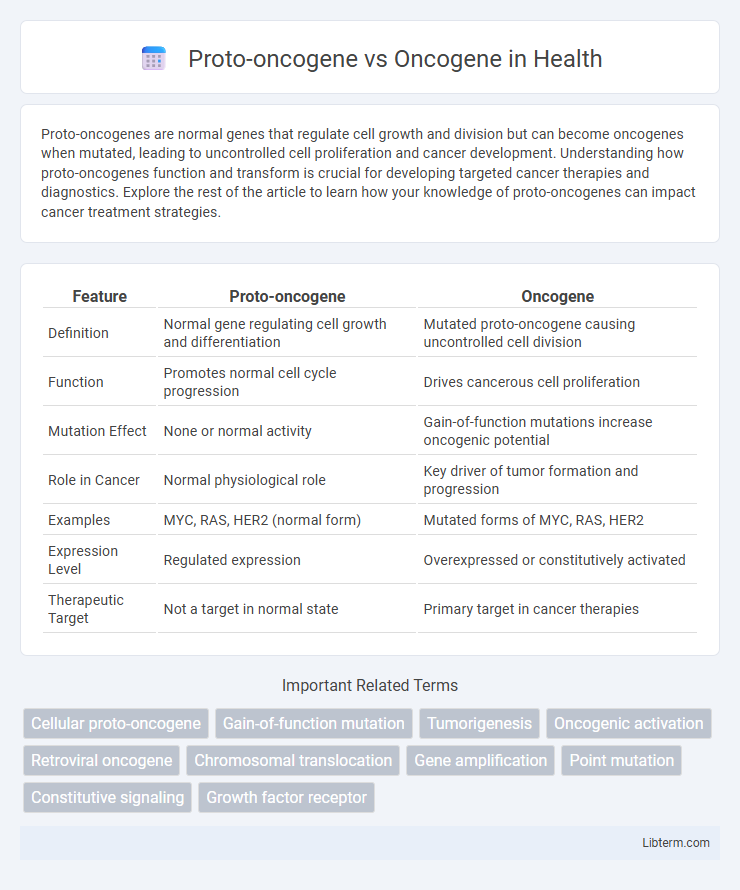Proto-oncogenes are normal genes that regulate cell growth and division but can become oncogenes when mutated, leading to uncontrolled cell proliferation and cancer development. Understanding how proto-oncogenes function and transform is crucial for developing targeted cancer therapies and diagnostics. Explore the rest of the article to learn how your knowledge of proto-oncogenes can impact cancer treatment strategies.
Table of Comparison
| Feature | Proto-oncogene | Oncogene |
|---|---|---|
| Definition | Normal gene regulating cell growth and differentiation | Mutated proto-oncogene causing uncontrolled cell division |
| Function | Promotes normal cell cycle progression | Drives cancerous cell proliferation |
| Mutation Effect | None or normal activity | Gain-of-function mutations increase oncogenic potential |
| Role in Cancer | Normal physiological role | Key driver of tumor formation and progression |
| Examples | MYC, RAS, HER2 (normal form) | Mutated forms of MYC, RAS, HER2 |
| Expression Level | Regulated expression | Overexpressed or constitutively activated |
| Therapeutic Target | Not a target in normal state | Primary target in cancer therapies |
Introduction to Proto-oncogenes and Oncogenes
Proto-oncogenes are normal genes that play a crucial role in cell growth and division by encoding proteins involved in signaling pathways that regulate proliferation. Oncogenes arise from mutations or overexpression of proto-oncogenes, leading to uncontrolled cellular proliferation and contributing to the development of cancer. Understanding the molecular mechanisms underlying proto-oncogene activation and oncogene function is essential for targeted cancer therapies.
Defining Proto-oncogenes: Normal Cellular Roles
Proto-oncogenes are essential genes that encode proteins responsible for regulating normal cell growth, differentiation, and survival by controlling signaling pathways such as those involving growth factors, receptors, and transcription factors. These genes maintain cellular homeostasis and ensure proper cell cycle progression, acting as critical components in embryonic development and tissue repair. Mutations or abnormal activation of proto-oncogenes can transform them into oncogenes, leading to uncontrolled cell proliferation and cancer development.
What Are Oncogenes?
Oncogenes are mutated or abnormally expressed versions of proto-oncogenes that drive uncontrolled cell proliferation, contributing to cancer development. They encode proteins involved in signal transduction pathways, such as growth factors, receptors, and transcription factors, which when deregulated, lead to tumorigenesis. Common examples of oncogenes include HER2, MYC, and RAS, each playing a critical role in promoting malignancy by overriding normal cellular regulatory mechanisms.
Mechanisms of Proto-oncogene Activation
Proto-oncogenes become oncogenes through mechanisms such as point mutations, gene amplification, and chromosomal translocations, which lead to increased or uncontrolled protein activity driving cell proliferation. These alterations disrupt normal regulatory pathways by either producing constitutively active proteins or overexpressing growth-promoting signals. Activation of proto-oncogenes frequently involves key genes like RAS, MYC, and HER2, pivotal in oncogenic signaling cascades.
Genetic Mutations Leading to Oncogene Formation
Proto-oncogenes are normal genes that regulate cell growth and division, but genetic mutations such as point mutations, gene amplifications, or chromosomal translocations can convert these proto-oncogenes into oncogenes. Oncogenes, unlike their proto-oncogene counterparts, promote uncontrolled cellular proliferation and contribute to tumor development. These mutations lead to gain-of-function alterations, causing the encoded proteins to be permanently active or overexpressed, driving cancer progression.
Key Differences Between Proto-oncogenes and Oncogenes
Proto-oncogenes are normal genes involved in cell growth and division, while oncogenes arise from mutations in proto-oncogenes that cause uncontrolled cell proliferation. Proto-oncogenes encode proteins that regulate signaling pathways essential for normal cellular functions, whereas oncogenes produce abnormally active proteins that drive cancer development. The key difference lies in the functional state: proto-oncogenes promote regulated growth, whereas oncogenes lead to unregulated cellular signaling and tumorigenesis.
Common Examples of Proto-oncogenes and Oncogenes
Common examples of proto-oncogenes include RAS, MYC, and HER2, which play crucial roles in normal cell growth and division. When mutated or overexpressed, these proto-oncogenes become oncogenes, driving uncontrolled cell proliferation leading to cancer. Oncogenes such as mutated RAS, amplified MYC, and overexpressed HER2 are frequently observed in various cancers like lung, breast, and colorectal carcinomas.
Role in Cancer Development and Progression
Proto-oncogenes are normal genes that regulate cell growth and division, but mutations or overexpression can convert them into oncogenes, driving uncontrolled cell proliferation. Oncogenes promote cancer development by triggering continuous signaling pathways that lead to tumor growth, invasion, and metastasis. The transition from proto-oncogene to oncogene is a critical step in cancer progression, as it disrupts normal cellular regulation and contributes to malignancy aggressiveness.
Diagnostic and Therapeutic Implications
Proto-oncogenes are normal genes that regulate cell growth and differentiation, but when mutated or overexpressed, they become oncogenes driving uncontrolled cell proliferation and cancer development. Diagnostic techniques such as PCR and FISH detect specific oncogene mutations or amplifications to guide personalized cancer treatment strategies. Targeted therapies like tyrosine kinase inhibitors and monoclonal antibodies specifically inhibit oncogene products, improving therapeutic outcomes and minimizing toxicity in oncology care.
Future Directions in Oncogene Research
Future directions in oncogene research emphasize the development of highly targeted therapies that specifically inhibit oncogene-driven signaling pathways, leveraging advances in CRISPR-Cas9 gene editing and single-cell sequencing technologies. Integrative multi-omics approaches aim to differentiate between proto-oncogene activation and oncogene mutations, enabling personalized cancer treatment strategies with improved efficacy. Emerging research also explores the role of non-coding RNAs and epigenetic modifications in oncogene regulation, potentially unveiling novel drug targets for resistant cancer types.
Proto-oncogene Infographic

 libterm.com
libterm.com